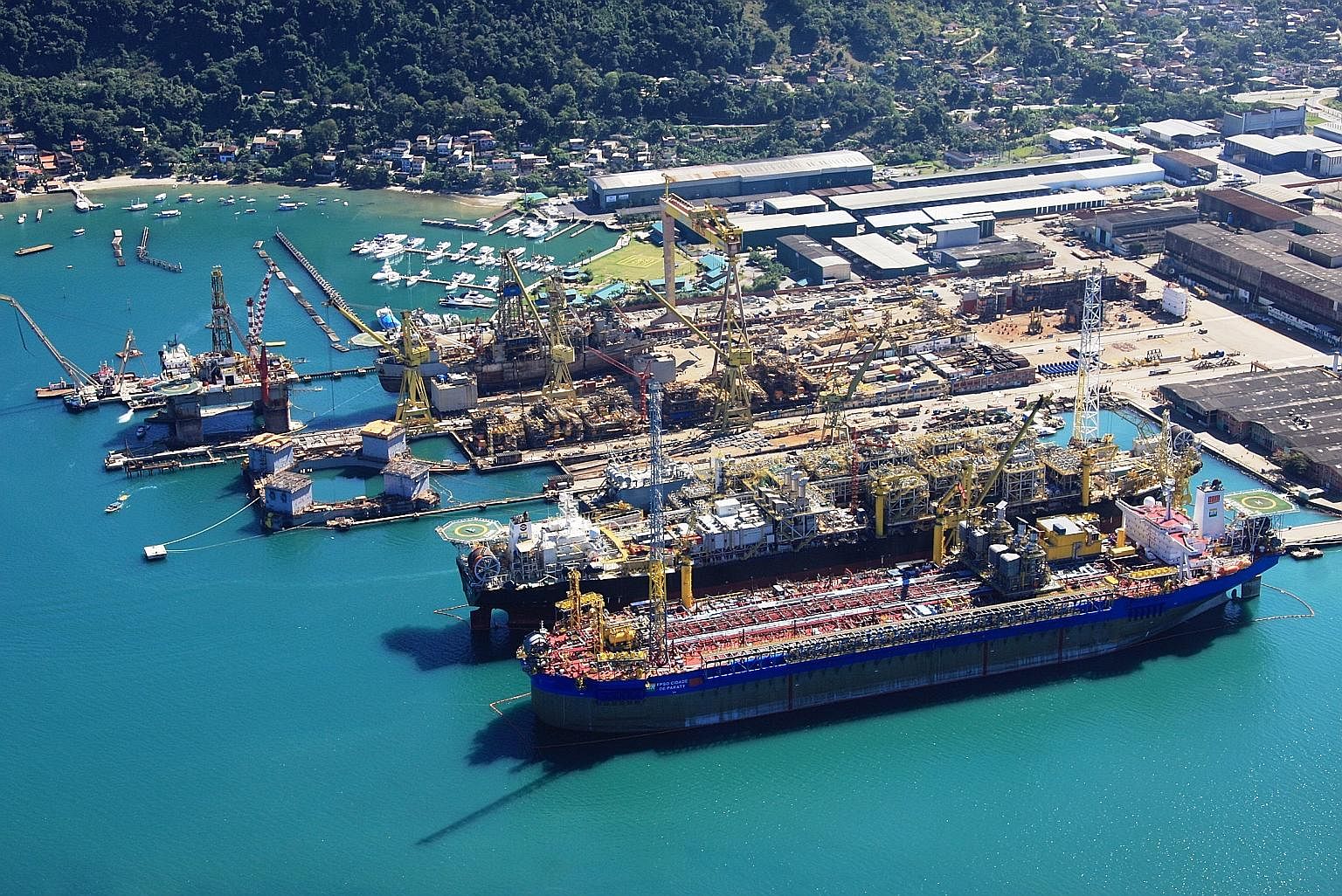This Christmas is going down in history as perhaps the most disquieting for Singapore's stock market and its embattled offshore and marine (O&M) sector, with shares of both Keppel Corp and Sembcorp Marine tumbling yesterday.
This follows Keppel O&M's disclosure last Saturday that it will pay US$422 million (S$567million) in fines as part of a global resolution for a corruption probe across three jurisdictions in Singapore, Brazil and the United States.
That spells a new blow for the beleaguered O&M sector, which is just about to turn a corner with oil prices stabilising in a healthier band for several months now.
For a start, Keppel O&M's revelation has put Sembcorp Marine under the spotlight.
Sete Brasil was behind about US$10 billion of rig-building contracts that were awarded to Keppel O&M and SembMarine. The Sete Brasil contracts have come under review in a US Department of Justice investigation over alleged corrupt payments by a former agent of Keppel O&M in Brazil.
IHS Markit's APAC lead for yards and fabrication, Mr Ang Dingli, said that considering the circumstances leading to Keppel O&M's fines, SembMarine will inevitably face an overhang, given the uncertainty over rig builder Sete Brasil's role in the cross-border probe. He qualified, though, that it is too early to speculate on any outcome as investigations are ongoing.
In Keppel O&M's case, the corrupt payments made by its former agent Zwi Skornicki in relation to Sete Brasil rig-building contracts and other projects, were made with the approval or knowledge of the yard group's former senior executives.
SembMarine could face heat spilling over from probes involving Sete Brasil, though to date, no evidence compromising the yard group's standing has yet been cited by the three jurisdictions.

For now, Keppel O&M's announced fines look set to go down in history as a record settlement for a cross-border corruption probe involving a Singapore-listed entity.
That said, the situation confronting Keppel O&M is far from unique.
US law firm Gibson Dunn's partner Robson Lee considers the case a reflection of the "potential pitfalls for companies doing business overseas". He sees the US$422 million fines as "an expedient way" to bring such matters to conclusion.
It was just over a year ago that the world's largest floating production contractor, SBM Offshore, concluded a leniency agreement with the authorities in Brazil.
SBM Offshore had to pay hundreds of millions in fines to Petrobras and the government of Brazil. That was on top of another out-of-court settlement with the Dutch authorities in 2014.
Yet, instead of retreating from Brazil, SBM continued to do business with Petrobras, an outcome also made possible by the leniency agreement.
IHS Markit's Mr Ang argued that Singapore businesses should learn from SBM's experience in Brazil. In SBM's case, the circumstances leading up to the leniency agreement did not "haunt the company" for long. On the contrary, Petrobras did not even cancel pre-existing contracts with SBM as a result of the incident, he said.
Both Keppel O&M and SembMarine have maintained that their Sete Brasil rig-building contracts are still legally standing.
A Keppel spokesman clarified that the settlement with the jurisdictions in Brazil, the US and Singapore, which it termed "a global resolution", does not address the offshore and marine unit's contracts with Sete Brasil. "We believe the contracts with Sete Brazil remain valid."
SembMarine said: "Our Sete Brasil contracts remain in our order book; the contracts are ongoing while Sete Brasil is in judicial restructuring. With Petrobras and Sete Brasil mediation still in progress, we are unable to comment further on the project."
The yard groups have maintained that they have extended adequate provisions to their Sete Brasil exposure.
Further to the statement on Sete Brasil, Keppel O&M has said it will continue its operations in Brazil.
There are good reasons to do so.
For about two decades now, Keppel O&M and SembMarine have sunk massive investments in Brazil. With the recent oil price rebound, upstream oil and gas projects are being revived and Brazil is taking the lead in at least one segment.
IHS Markit projected that Brazil will account for 11 out of 45 floating production, storage and offloading vessel contracts to be awarded in the next five years.
Mr Ang believes the Brazilian units of Keppel O&M and SembMarine are still in good position to land contracts with upstream oil and gas (O&G) projects there, because they stand among the most established contractors capable of delivering local content, which is expected to remain a key component of Brazil's O&G procurement policy. Numerous Brazilian-run yards have collapsed in the protracted O&M downturn.
Mr Ang considers the "local agent or joint venture partner" the weakest link for international contractors seeking to comply with high levels of corporate governance.
That is part and parcel of life for companies seeking to break into an emerging economy and aspiring to cultivate local capabilities.
In Mr Lee's view, "weeding out non-transparent practices completely" is a "highly implausible" task - and with each new unfortunate episode, the onus still lies on companies to "tighten governance practices and internal controls".
"The jurisdictions have to clamp down on any errant parties vigorously once such practices are detected because countries risk repercussions on their standings in the absence of robust enforcement," he said.
"For policymakers, it can be a fine balance between upholding the standing of the nation-state and encouraging entrepreneurship and international enterprises."

